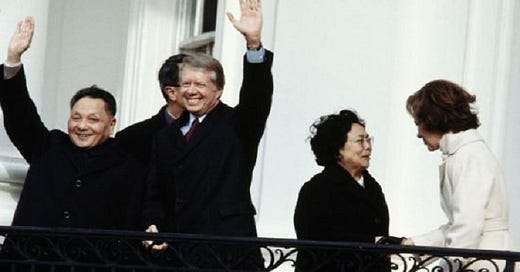We could do with a little more pragmatism in the world.
Instead, emotion and ego run wild. Anger runs deep.
It applies to each of us. Do we get the revenge, hold the grudge, prove the point? Or do we take the pragmatic approach?
They’re two very different paths.
Welcome! If you’re reading this but haven’t subscribed you can do here:
Deng
There have been few greater pragmatists than Deng Xiaoping.
Deng turned China into the global powerhouse we know today. He took over a country in ruins; still reeling from Chairman Mao’s catastrophic cultural revolution.
A word on Mao first. He was not such a pragmatist.
His 27 year rule of China was driven by ego.
Every decision taken to strengthen the cult of Mao. His sheer force of nature drove him to the very top, creating a dictatorship. But that same force led to disaster.
The regime became deluded. The government obsessed with showing growth at all costs. During Mao’s “Great Leap Forward” every result was falsified. Everything from food production to steel was dramatically inflated. All to show just how great a job Mao was doing.
This soon lead to tragedy. The falsified figures were taken as fact, and obscured a looming famine. The famine hit is 1959 and over the next two years tens of millions of people died, some estimates suggest 55 million.
Mao responded with denial.
He continued the narrative that all was well. His ego ruled supreme.
Changing the Narrative
Deng was different. He had a strength that Mao did not:
Humility.
Deng suffered during Mao’s reign, spending years ostracised and labelled an enemy of the state. But he was a pragmatist. And he knew that regardless of what had happen, if he wanted to change China he must stay on Mao’s side.
So he bided his time, and when Mao relented he stepped calmly back into the fold. Not a drop of resentment.
Whilst Mao lived Deng stayed loyal to him, and his ideology; long after he realised it wasn’t the path forward. He knew that the cult of Mao remained strong and to win the people he must remain inline with Mao, for now.
Through sheer pragmatism and humility Deng manoeuvred himself into power, emerging as the country’s leader in the volatile period after Mao. And it was then, once in power that his pragmatism truly shone through.
China was on its knees. A proud, and once great country now well behind much of the world. It took a leader like Deng to recognise that, to accept it, and to do something about it.
He completely changed the narrative. Gone were the claims of China’s greatness, replaced instead by admissions of it’s failings.
Deng used this same humility with the Global Powers.
To Japan he spoke of how far behind them China were and how they must learn from Japanese technology. He sat down with the US and agreed to put aside the thorny issue of Taiwan (yes, even then). He saw no progress would be made without concession.
He picked his battle, parked his ego, and restarted a nation.
Ten years after his 1978 reforms China was flying, growing 10% a year. By 1998 income per capita was up a staggering 1400%. And we all know where it went from there.
Pick Your Battles
We have opportunities for pragmatism everyday.
When we’re triggered by the unreasonable email or sly comment, it’s easy to act with ego. To protect our pride and to not let the bastards get away with it.
But what if we stopped asking what’s right and what we deserve, and asked instead:
What is in my best interest?
The answer is rarely firing back an angry email, or belittling the other person. No, the pragmatic response is to ignore the emotions. To empathise with the other person, and meet them where they are. Do that and your days will become easier.
Take receiving a fine for example. People will spend months, or even years, contesting a £50 fine. By which point the cost of time and sanity far out weigh the monetary value.
It’s the principle we tell ourselves. A dangerous phrase.
If Deng can let go years of mental and physical abuse to him and his family, then you can let go a strongly worded letter from Hackney council.
Because as you stand there with that letter you have a choice: Do I fight this and sign up for the costs of doing so, or do I pay it, move on with my life and focus on bigger things?
We have hundreds of these decisions each day. So pick your battles, park you ego, and try on a little pragmatism. Good luck.
A Final Thought 💡
“Humility and knowledge in poor clothes excel pride and ignorance in costly attire.”
– William Penn





Yet another step forward from “What’s in my interest?” is “What’s the right thing to do?”
Sometimes it’s not in our interest short-term and it is still the right thing to do.